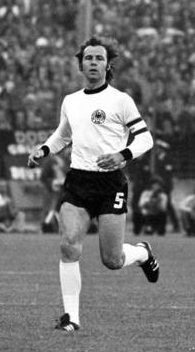Franz Beckenbauer, known affectionately as “Der Kaiser,” is a towering figure in the world of football. His legacy is marked by grace, strategic acumen, and leadership, making him one of the most influential players and managers in the history of the sport. This blog post explores the life and career of Beckenbauer, highlighting his contributions and the lasting impact he has made on football.
Early Life and Ascendancy

Born on September 11, 1945, in Munich, Germany, Franz Beckenbauer started his football journey at a young age with SC Munich ’06 before moving to Bayern Munich. His talent was evident early on, and he quickly became a central figure in Bayern’s rise to prominence. Beckenbauer’s playing style revolutionized the libero or sweeper role. Unlike traditional defenders, he was known for his ability to orchestrate play from the back, initiating attacks with his excellent passing and vision.
Career Highlights

Beckenbauer’s club career, primarily with Bayern Munich, was studded with successes, including multiple Bundesliga titles and three consecutive European Cups from 1974 to 1976. His international career was equally impressive. Beckenbauer captained West Germany to victory in the 1974 FIFA World Cup and was a pivotal player in the 1972 European Championships. His leadership on the field was unmatched, and his ability to read the game made him a formidable opponent.
Transition to Management
After retiring as a player, Beckenbauer took on the role of a manager, where he continued to achieve success. He managed the West Germany team to a World Cup victory in 1990, making him one of the few individuals to win the tournament as both a player and a manager. His management style was characterized by a strong tactical understanding and the ability to adapt his approach to suit the strengths of his team.
Legacy and Influence
Beckenbauer’s impact on football is immense. He not only set standards as a player and a manager but also influenced generations of players who aspired to emulate his style. His contributions to German football are particularly notable, having played a key role in popularizing the sport in the country during the 1960s and 1970s.
Beyond his on-field achievements, Beckenbauer has been involved in football administration and has been a prominent figure in promoting Germany’s bid to host various international tournaments, including the successful 2006 FIFA World Cup bid.
Personal Life and Off-Field Endeavors
Off the field, Beckenbauer has been a charismatic ambassador for football, involved in various charitable works and business ventures. His personality and charm have made him a beloved figure not just in Germany, but around the world.
Conclusion
Franz Beckenbauer remains a symbol of excellence in football. His contributions transcend his playing days, leaving a legacy that continues to influence the sport. As football evolves, the principles of play that Beckenbauer exemplified—vision, leadership, and tactical intelligence—remain as relevant as ever. For fans and players alike, “Der Kaiser” is more than just a former player; he is an enduring icon of the beautiful game.